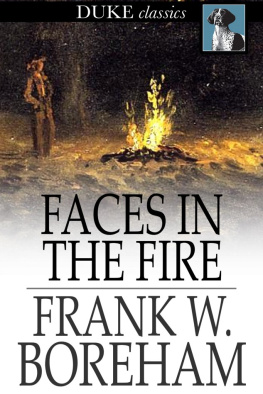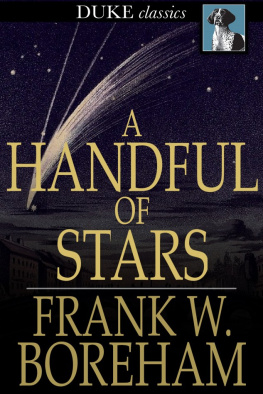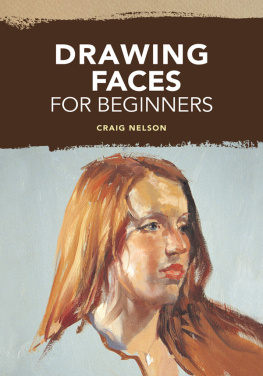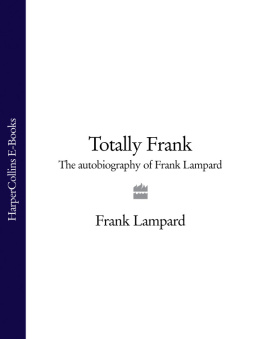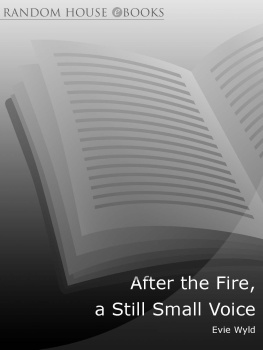Frank W. Boreham - Faces in the Fire: And Other Fancies
Here you can read online Frank W. Boreham - Faces in the Fire: And Other Fancies full text of the book (entire story) in english for free. Download pdf and epub, get meaning, cover and reviews about this ebook. year: 2013, publisher: Duke Classics, genre: Science. Description of the work, (preface) as well as reviews are available. Best literature library LitArk.com created for fans of good reading and offers a wide selection of genres:
Romance novel
Science fiction
Adventure
Detective
Science
History
Home and family
Prose
Art
Politics
Computer
Non-fiction
Religion
Business
Children
Humor
Choose a favorite category and find really read worthwhile books. Enjoy immersion in the world of imagination, feel the emotions of the characters or learn something new for yourself, make an fascinating discovery.
- Book:Faces in the Fire: And Other Fancies
- Author:
- Publisher:Duke Classics
- Genre:
- Year:2013
- Rating:5 / 5
- Favourites:Add to favourites
- Your mark:
- 100
- 1
- 2
- 3
- 4
- 5
Faces in the Fire: And Other Fancies: summary, description and annotation
We offer to read an annotation, description, summary or preface (depends on what the author of the book "Faces in the Fire: And Other Fancies" wrote himself). If you haven't found the necessary information about the book — write in the comments, we will try to find it.
Though Baptist preacher Frank W. Boreham was born and educated in England and first rose to prominence as a religious thinker there, he spent many of his later years working as a missionary in New Zealand, Tasmania, and Australia. The essays in the collection Faces in the Fire are largely autobiographical in nature, drawing on lessons Boreham learned during his travels.
Faces in the Fire: And Other Fancies — read online for free the complete book (whole text) full work
Below is the text of the book, divided by pages. System saving the place of the last page read, allows you to conveniently read the book "Faces in the Fire: And Other Fancies" online for free, without having to search again every time where you left off. Put a bookmark, and you can go to the page where you finished reading at any time.
Font size:
Interval:
Bookmark:

And Other Fancies
First published in 1917
ISBN 978-1-62013-494-8
Duke Classics
2013 Duke Classics and its licensors. All rights reserved.
While every effort has been used to ensure the accuracy and reliability of the information contained in this edition, Duke Classics does not assume liability or responsibility for any errors or omissions in this book. Duke Classics does not accept responsibility for loss suffered as a result of reliance upon the accuracy or currency of information contained in this book.
It was a chilling experience, that first glimpse of New Zealand! Hourafter hour the great ship held on her way up the Cook Straits amidstscenery that made me shudder and that scowled me out of countenance.Rugged, massive, inhospitable, and bare, how sternly those wild andmountainous landscapes contrasted with the quiet beauty that I hadsurveyed from the same decks as the ship had dropped down Channel! Ishaded my eyes with my hands and swept the strange horizon at everypoint, but nowhere could I see a sign of habitationno man; no beast;no sheltering roof; no winding road; no welcoming column of smoke! Andwhen, in the twilight of that still autumn evening, I at lengthdescended the gangway, and set foot for the first time on the land of myadoption, I found myselftwelve thousand miles from homein a countryin which not a soul knew me, and in which I knew no single soul. It wasnot an exhilarating sensation.
That was on March 11, 1895twenty-one years ago to-night. Thoseone-and-twenty years have been almost evenly divided between the oldmanse at Mosgiel, in New Zealand, and my present Tasmanian home. As Isit here, and let my memory play among the years, I smile at the odd wayin which these southern lands have belied that first austere impression.In my fire to-night I see such crowds of facesthe faces of those withwhom I have laughed and cried, and camped and played, and worked andworshipped in the course of these one-and-twenty years. There arefancy-faces, too; the folk of other latitudes; the faces I have neverseen; the friends my pen has brought me. I cannot write to all to-night;so I set aside this book as a memento of the times we have spenttogether. If, by good hap, it reaches any of them, let them regard it asa shake of the hand for the sake of auld lang syne. And if, in additionto cementing old friendships, it creates new ones, how doubly happy Ishall be!
FRANK W. BOREHAM.
Hobart, Tasmania.
Everything depends on keeping up the supply of bombshells. It will be asad day for us all when there are no more bombs to burst, no more shocksto be sustained, no more sensations to be experienced, no more thrillsto be enjoyed. Fancy being condemned to reside in a world that isbankrupt of astonishments, a world that no longer has it in its power tostartle you, a world that has nothing up its sleeve! It would be likeoccupying a seat at a conjuring entertainment at which the conjurer hadexhausted all his tricks, but did not like to tell you so! When I was asmall boy I used to be mildly amused by the antics of a performing bearthat occasionally visited our locality. A sickly-looking foreigner ledthe poor brute by a string. Its claws were cut, and its teeth drawn. Bydint of a few kicks and cuffs it was persuaded to dance a melancholykind of jig, and then shamble round with a basket in search of a fewhalf-pence. I remember distinctly that, as I watched the unhappycreature's dismal performance, I tried to imagine what the animal wouldhave looked like had no cruel captor removed him from his native lair.The mental contrast was a very painful one. Yet it was not half sopainful as the contrast between the world as it is and a world that hadrun out of bombshells. A world that could no longer surprise us would bea world with its claws cut and its teeth drawn. Half the fun of wakingup in the morning is the feeling that you have come upon a day that isbrand new, a day that the world has never seen before, a day that iscertain to do things that no other day has ever done. Half the pleasureof welcoming a new-born baby is the absolute certainty that here youhave a packet of amazing surprises. An individuality is here; a thingthat never was before; you cannot argue from any other child to thisone; the only thing that you can predict with confidence about thischild is that it will do things that were never done, or never done inthe same way, since this old world of ours began. Here is novelty,originality, an infinity of bewildering possibility. Each mother thinksthat there never was a baby like her baby; and most certainly therenever was. As long as the stock of days keeps up, and as long as thesupply of babies does not peter out, there will be no lack ofbombshells. I visited the other day the ruins of an old prison. I sawamong other things the dark cells in which, in the bad old days,prisoners languished in solitary confinement. Charles Reade and otherwriters have told us how, in those black holes, convicts adopted allkinds of ingenious expedients to secure themselves against losing theirreason in the desolate darkness. They tossed buttons about and gropedafter them; they tore up their clothes and counted the pieces; they dida thousand other things, and went mad in spite of all their pains. Nowwhat is this horror of the darkness? Let us analyse it. Wherein does itdiffer from blindness? Why did insanity overtake these solitary men? Thehorror of the darkness was not fear. A child dreads the dark because hethinks that wolves and hobgoblins infest it. But these men had no suchterrors. The thing that unbalanced them was the maddening monotony ofthe darkness. Nothing happened. In the light something happens everysecond. A thousand impressions are made upon the mind in the course ofevery minute. Each sensation, though it be of no more importance thanthe buzz of a fly at the window-pane, the flutter of a paper to thefloor, or the sound of a footfall on the street, represents a surprise.It is a mental jolt. It transfers the attention from one object to anentirely different one. We pass in less than a second from the buzz ofthe fly to the flutter of the paper, and again from the flutter of thepaper to the sound of the footfall. Any man who could count the separateobjects that occupied his attention in the course of a single momentwould be astonished at their variety and multiplicity. But in the darkcell there are no sensations. The eye cannot see; the ear cannot hear.Not one of the senses is appealed to. The mind is accustomed to flitfrom sensation to sensation like a butterfly flitting from flower toflower, but infinitely faster. But in this dark cell it languishes likea captive butterfly in a cardboard box. If you hold me under water Ishall die, because my lungs can no longer do the work they have alwaysbeen accustomed to do. In the dark cell the mind finds itself in thesame predicament. It is drowned in inky air. The mind lives onsensations; but here there are no sensations. And if the world getsshorn of its surprise-power, it will become a maddening place to livein. We only exist by being continually startled. We are kept alive bythe everlasting bursting of bombshells.
I am not so much concerned, however, with the ability of the world toafford us a continuous series of thrills as with my own capacity to besurprised. The tendency is to lose the power of astonishment. I am toldthat, in battle, the moment in which a man finds himself for the firsttime under fire is a truly terrifying experience. But after awhile thenew-comer settles down to it, and, with shells bursting all around him,he goes about his tasks as calmly as on parade. This idiosyncrasy ofours may be a very fine thing under such circumstances, but under otherconditions it has the gravest elements of danger. As I sit here writing,a baby crawls upon the floor. It is good fun watching him. He plays withthe paper band that fell from a packet of envelopes. He puts it roundhis wrist like a bracelet. He tears it, and lo, the bracelet of a momentago is a long ribbon of coloured paper. He is astounded. His wide-openeyes are a picture. The telephone rings. He looks up with approval.Anything that rings or rattles is very much to his taste. I go over tohis new-found toy, and begin talking to it. He is dumbfounded. Myaltercation with the telephone completely bewilders him. Whilst I amthus occupied, he moves towards my vacant chair. He tries to pullhimself up by it, but pulls it over on to himself. The savagery of thething appals him; he never dreamed of an attack from such a source. Inwhat a world of wonder is he living! Bombs are bursting all around himall day long. A baby's life must be a thrillingly sensational affair.
Font size:
Interval:
Bookmark:
Similar books «Faces in the Fire: And Other Fancies»
Look at similar books to Faces in the Fire: And Other Fancies. We have selected literature similar in name and meaning in the hope of providing readers with more options to find new, interesting, not yet read works.
Discussion, reviews of the book Faces in the Fire: And Other Fancies and just readers' own opinions. Leave your comments, write what you think about the work, its meaning or the main characters. Specify what exactly you liked and what you didn't like, and why you think so.

